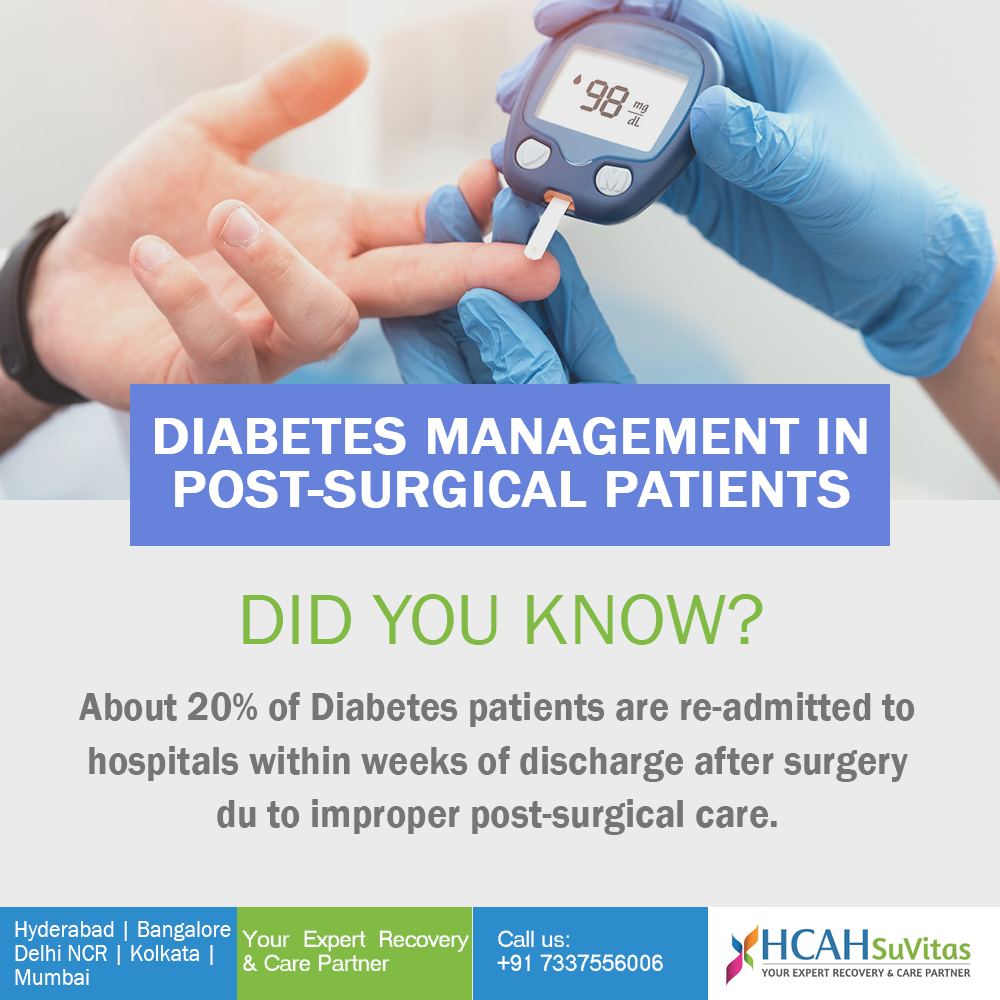Effective Diabetes Management in Post Surgical Patients
India is expected to have around 98 million people with Type 2 Diabetes Mellitus within the next decade. Urbanization, anomalies in diet and lifestyle, and aging are just some of the many factors that contribute to this looming health challenge. However, managing diabetes-related complications in surgical patients is an often-under-discussed subject in our country. Diabetes is one of the most recognized factors for a patient to be considered as a high-risk surgical patient. Those who have had diabetes for an extended period of time or experienced difficulty in controlling blood glucose levels are particularly prone to added complications.
Diabetes patients usually show delayed recovery after surgery due to a variety of reasons. One of the key reasons attributed to this is increased insulin resistance as a result of the surgery. Often diabetes patients are the first to get infections from wounds that lead to several other health issues. Diabetics and patients with a history of fluctuations in blood glucose are therefore recommended to undergo meticulous initial assessment before surgery and seek expert support during the recovery phase.
Risks and Complications for Surgical Patients with Diabetes:
Diabetics who undergo emergency surgical procedures are prone to higher complications including perioperative morbidity and mortality.
Some of the commonly found complications in diabetics following a surgery are Hyperglycaemia (high blood glucose), Hypoglycaemia (low blood glucose), slower healing of wounds often with a risk of infection, pneumonia, urinary tract infections, diabetic ketoacidosis (DKA) and electrolyte imbalance. Electrolyte imbalance can cause serious issues with the heart and the body’s fluid levels since it disrupts the sodium or potassium in the body.
Managing Diabetes before Surgery:
Patients with well-controlled diabetes even in the weeks leading up to the surgery often have a commendable recovery. Unlike other lifestyle ailments, diabetes can be managed with right dietary choices and lifestyle modifications. Including high-quality protein-rich foods in diet and walking for at least 30-40 minutes a day can strengthen the body and contribute to faster healing of wounds. Eliminating alcohol and quitting smoking can also go a long way in managing blood glucose and returning to normal breathing soon after the surgery.
Rehabilitation Care in Diabetics Post Surgery:
Diabetes complicates postsurgical recovery, leads to prolonged hospital stays and higher readmissions. However, with intensive nursing and multidisciplinary care, patients with diabetes can return to preoperative levels of independence in activities of daily living and regain one’s optimum level of being within a short span of time. Expert providers in rehabilitation care follow established protocols for structured patient care. A specialized diabetes or glucose management team will also provide the patient and the family with diabetes self-management education to ensure best recovery.
Continuous bedside glucose monitoring, insulin and noninsulin therapy, medical nutrition therapy etc are some of the other interventions offered by rehabilitation care facilities for enhancing the recovery of diabetes patients.
The complications associated with diabetes are long term. Therefore, as soon as a patient is ready to be shifted to home, he/she must receive a customized and structured discharge plan. All information pertaining to medication changes, follow-up visits and pending tests will be duly communicated in order to address all gaps of knowledge before discharge.
The ideal care plan of diabetes management in post surgical recovery patients must flow from primary care referral to preoperative assessment, hospital admission and surgery, postoperative care, discharge and transition care before being shifted to home.
About 14- 20% of diabetes patients are readmitted to hospitals within weeks of discharge after surgery due to improper post surgical care. Specialized protocol-oriented rehabilitation programmes can successfully reduce post-surgical complications, reduce readmission rates and improve recovery rate along with quality of life.

